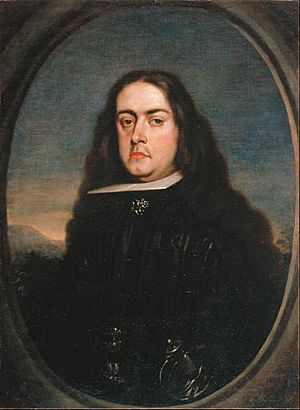Juan Francisco de la Cerda, 8th Duke of Medinaceli facts for kids
Juan Francisco de la Cerda Enríquez de Ribera (born in Medinaceli, Spain, on November 4, 1637 – died in Madrid, Spain, on February 20, 1691) was an important Spanish noble and politician. He held many titles, including the 8th Duke of Medinaceli. He was also a special advisor, known as a valido, to King Charles II of Spain.
Contents
Early Life and Family
Juan Francisco was the son of Antonio de la Cerda, 7th Duke of Medinaceli and Ana María Luisa Enríquez de Ribera Portocarrero y Cárdenas. His mother was the 5th Duchess of Alcalá de los Gazules.
Marriage and New Titles
Juan Francisco married Catalina de Aragón. Through this marriage, he brought even more important titles into his family, the House of Medinaceli. These included the titles of Duke of Segorbe, Cardona, and Lerma.
A Time of Change in Spain
In 1677, John of Austria the Younger became a powerful figure in Spain. He was the half-brother of King Charles II. At this time, King Charles II was young and did not have much experience. John of Austria the Younger removed the Queen Mother, Mariana of Austria, from the royal court. He then took on the role of prime minister. Many people hoped he would do a great job leading the country. However, his time in power was short. John of Austria the Younger died on September 17, 1679.
Becoming the King's Favorite
Like his family members before him, Juan Francisco de la Cerda was very loyal to the Spanish Crown. After John of Austria's death, Juan Francisco became the King's special advisor, or Valido. This meant he was the most trusted person to King Charles II and helped him make important decisions. He also held other important roles, such as Sumiller de Corps and Caballerizo mayor to the King. These roles involved managing the King's household and personal staff.
Economic Challenges and Reforms
As the King's Valido, Juan Francisco tried to fix Spain's economy. He created a group called the Junta de Comercio y Moneda (Board of Trade and Currency). He made big changes to the money system. However, his plan to change the value of money did not work as expected. It caused prices to drop sharply and led to people buying and selling grain in a way that caused problems. This resulted in many businesses failing.
Public Unrest and Resignation
Because of the economic problems, people in many parts of Spain became very upset. There were even riots over food. Spain also faced a difficult peace agreement with France, called the Truce of Ratisbon. These challenges led Juan Francisco de la Cerda to resign from his position. He left politics and passed away in 1691. All his titles were then passed on to his son, Luis Francisco de la Cerda.
See also
 In Spanish: Juan Francisco de la Cerda para niños
In Spanish: Juan Francisco de la Cerda para niños
 | Janet Taylor Pickett |
 | Synthia Saint James |
 | Howardena Pindell |
 | Faith Ringgold |


